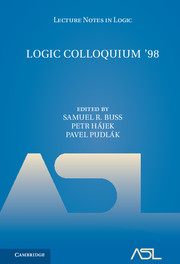Book contents
- Frontmatter
- Preface
- Opening speech of Petr Vopěnka
- Bolzano Medal awarded to Gaisi Takeuti
- Contents
- Collapsing Polynomial-Time Degrees
- Qualitative and Probabilistic Models of Full Belief
- Relative Splittings of in the-Enumeration Degrees
- A Realizability Interpretation for Classical Arithmetic
- An Axiomatization of Quantified Propositional Gödel Logic Using the Takeuti-Titani Rule
- Another Pathological Well-Ordering
- How Small Can the Set of Generics Be?
- Entailment Relations and Distributive Lattices
- The Friedberg Jump Inversion Theorem Revisited: A Study of Undefinable Cuts
- Hartley Rogers’ 1965 Agenda
- Liftings of Homomorphisms Between Quotient Structures and Ulam Stability
- Mathematical Fuzzy Logic – State of Art
- Reflections on the Last Delfino Problem
- Continuous Images of Coanalytic Sets
- Classification of Subsheaves over GL-Algebras
- On the Bit-Comprehension Rule
- Cardinal Invariants Associated with Predictors
- A Theorem on Countable Ordered Sets with an Application to Universal Graphs
- Dimension Theory and Smooth Stratification of Rigid Subanalytic Sets
- The Ramsey Structure of A-Determined Sets in a Saturated Universe
- On Definability of Admissible Sets
- Additive Theories
- Adding Multiplication to an O-minimal Expansion of the Additive Group of Real Numbers
- The Superjump in Martin-Löf Type Theory
- “Just Because”: Taking Belief Bases Seriously
- Artin Approximation via the Model Theory of Cohen-Macaulay Rings
- Ordinal Systems, Part 2: One Inaccessible
- Autonomous Fixed Point Progressions and Fixed Point Transfinite Recursion
- Finitary Reductions for Local Predicativity, I: Recursively Regular Ordinals
- The Complexity of Linear Logic with Weakening
- Some Remarks on the Maximality of Inner Models
- Author Index
- References
Relative Splittings of in the-Enumeration Degrees
Published online by Cambridge University Press: 31 March 2017
- Frontmatter
- Preface
- Opening speech of Petr Vopěnka
- Bolzano Medal awarded to Gaisi Takeuti
- Contents
- Collapsing Polynomial-Time Degrees
- Qualitative and Probabilistic Models of Full Belief
- Relative Splittings of in the-Enumeration Degrees
- A Realizability Interpretation for Classical Arithmetic
- An Axiomatization of Quantified Propositional Gödel Logic Using the Takeuti-Titani Rule
- Another Pathological Well-Ordering
- How Small Can the Set of Generics Be?
- Entailment Relations and Distributive Lattices
- The Friedberg Jump Inversion Theorem Revisited: A Study of Undefinable Cuts
- Hartley Rogers’ 1965 Agenda
- Liftings of Homomorphisms Between Quotient Structures and Ulam Stability
- Mathematical Fuzzy Logic – State of Art
- Reflections on the Last Delfino Problem
- Continuous Images of Coanalytic Sets
- Classification of Subsheaves over GL-Algebras
- On the Bit-Comprehension Rule
- Cardinal Invariants Associated with Predictors
- A Theorem on Countable Ordered Sets with an Application to Universal Graphs
- Dimension Theory and Smooth Stratification of Rigid Subanalytic Sets
- The Ramsey Structure of A-Determined Sets in a Saturated Universe
- On Definability of Admissible Sets
- Additive Theories
- Adding Multiplication to an O-minimal Expansion of the Additive Group of Real Numbers
- The Superjump in Martin-Löf Type Theory
- “Just Because”: Taking Belief Bases Seriously
- Artin Approximation via the Model Theory of Cohen-Macaulay Rings
- Ordinal Systems, Part 2: One Inaccessible
- Autonomous Fixed Point Progressions and Fixed Point Transfinite Recursion
- Finitary Reductions for Local Predicativity, I: Recursively Regular Ordinals
- The Complexity of Linear Logic with Weakening
- Some Remarks on the Maximality of Inner Models
- Author Index
- References
Summary
Summary. We prove some results on the degrees. We show that splits in the e-degrees above any incomplete degree; on the other hand, one can find a splitting of into e-degrees b and d, such that for any degree
Introduction
A set A is enumeration reducible (e-reducible) to a set B if there exists a recursively enumerable (r. e.) set (called in this context an enumeration operator, or, simply, an e-operator) such that
The structure De of the e-degrees is the structure of the equivalence classes (called e-degrees) of sets of numbers under the equivalence relation generated by the preordering the e-degree of A is denoted by the symbol. De is in fact an uppersemilattice with least element where any r. e. set W: the partial ordering relation of will be denoted by
Throughout the paper we will refer to some fixed acceptable numbering of the (r. e.) sets; we therefore obtain a corresponding listing of the e-operators. We will consider finite recursive approximations to the r.e. sets (in the sense of [20, p.16]). We get corresponding finite recursive approximations to the e-operators. We will indicate by the approximation to defined by where is some fixed finite recursive approximation to K.
We adopt the usual notational conventions: see for instance Soare [20], and Cooper [9]. Given a set F, let and. Thus, We sometimes identify a given finite set with its canonical index, thus writing for instance to denote the number where u is the canonical index of F. If B and then if then
It is known ([16], [19]) that the e-degrees extend the structure of the Turing degrees: the mapping defined by (where and denote the Turing degree and the characteristic function of A, respectively) defines an order theoretic embedding preserving joins and least element.
The degrees
McEvoy ([15]) defines a jump operation on. Of particular interest is the structure (it is known that. It is shown in [8] that S is dense and S coincides with the structure of the (in fact, if and only if). One can distinguish several substructures of S. In particular, the correspond, under the above mentioned embedding, to the r. e. Turing degrees a is a if and only if for some r. e.
- Type
- Chapter
- Information
- Logic Colloquium '98 , pp. 44 - 56Publisher: Cambridge University PressPrint publication year: 2000



